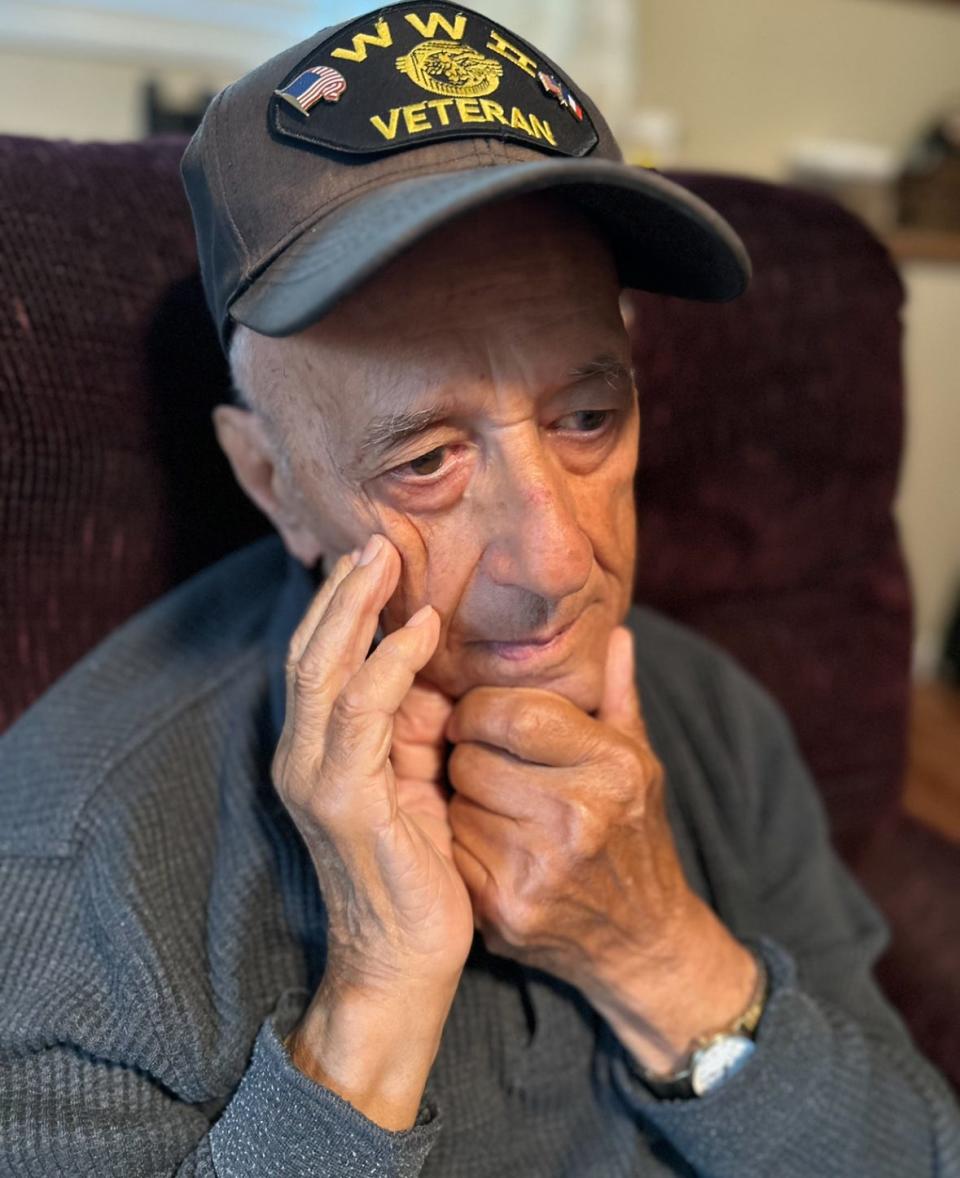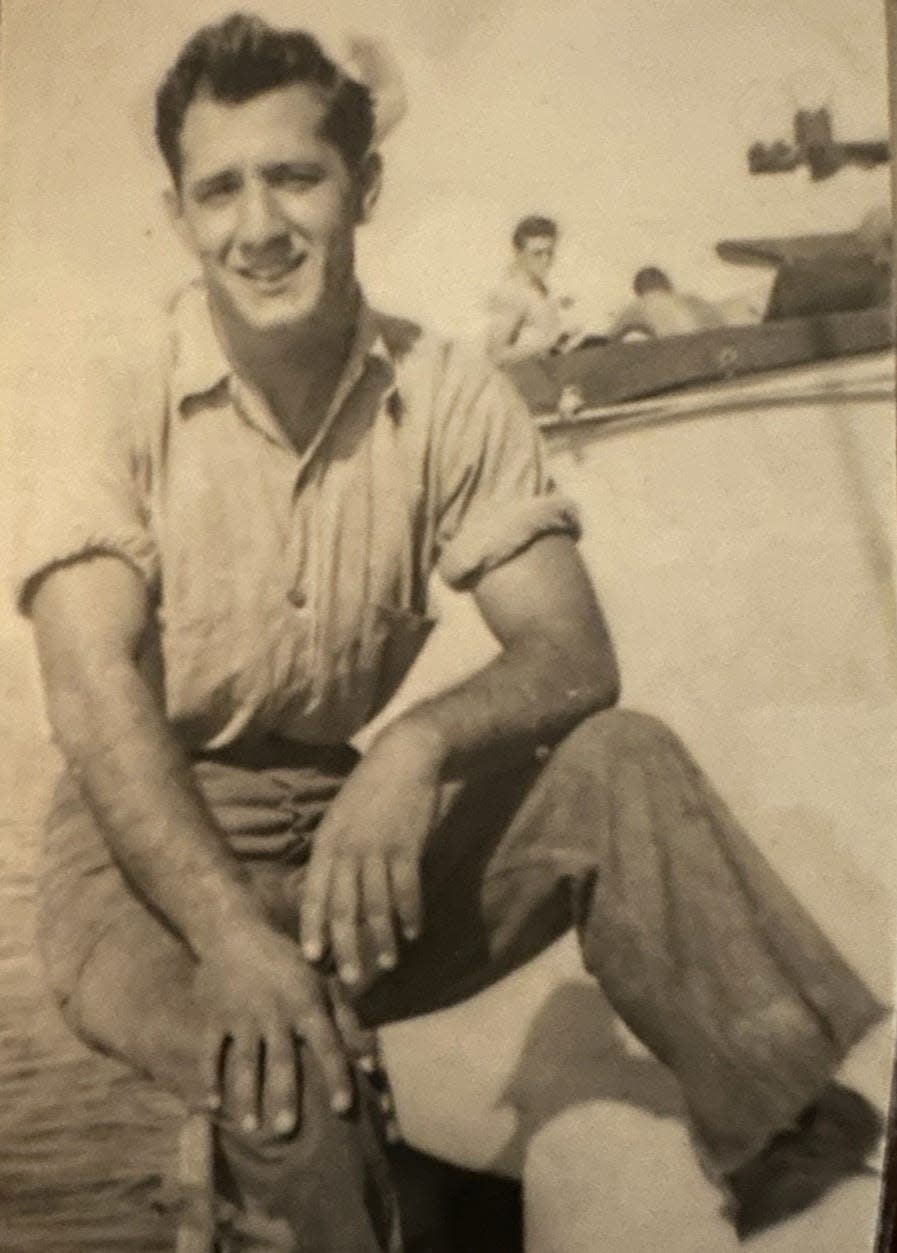D-Day memories are still vivid for this 99-year-old RI vet. Mark Patinkin shares his story
You would think that after 80 years, the emotions of surviving D-Day would fade, but as Richard Fazzio, now 99, speaks of it, he has to pause, his hands over his face.
Fazzio still lives independently in a small apartment in the home of a granddaughter in Woonsocket, the town where he grew up.
If you’ve seen “Saving Private Ryan,” that’s what Fazzio went through. He was in the first wave that landed on Omaha Beach, driving a Higgins boat that dropped off more than 30 soldiers.
Many were killed as soon as the ramp dropped, Fazzio almost among them, a bullet striking his upper right side below his arm and exiting his back.
He tells me he is unable to sleep when thoughts of the day come back to him.
Yet most of the time, Fazzio is an upbeat guy, and he offers a firm handshake as I greet him.

He sits back down in a La-Z-Boy, a cane next to him – that’s all he needs to get around, and often not even that. He’s wearing a dark hat that says “WWII Veteran.”
Of the 150,000 who landed on D-Day, only a few thousand are left. Fazzio is among the final handful in Rhode Island.
Just about everyone he knew in the Navy is gone now, including his crew of four who piloted the boat through German shellfire. One of them was from Cumberland, Wally Lawton.
“We used to visit each other, the four of us,” Fazzio said.
But the old Woonsocket sailor is now the last one. At age 99, he’s got a son, Frank, 70, and daughter, Frances, 74. Both were named after Fazzio’s older brother Frank who sadly was killed in the war. Frank was a soldier in the Pacific, pinned down in the Philippines, intentionally drawing fire his way to help his buddies fight back, and he paid the price.
“She was never the same after that,” Fazzio said of his mom. “I would have stayed in the Navy if it wasn’t for that. But I thought I’d better get out.” For her.
Fazzio is a classic Rhode Island story, son of Italian immigrants, raised in working-class Woonsocket, his father, Charles, a handyman and construction guy.
Fazzio wanted to get into similar work, so he quit school at 16.
“I had one subject I liked, recess,” he jokes.

But he was serious enough to want to enlist in the Navy in 1943, when he was 17.
“I remember my father, he wouldn’t sign for me,” Fazzio recalls. “But I kept begging him, and finally he came around. He was crying when he signed.”
I asked if he still remembers D-Day clearly.
“How can I forget?”
His job was to ferry infantry the final miles to the beach from a big transport ship. It was pitch dark when the battleships around him there in the English Channel opened fire on the German defenders ashore.
“It was like the Fourth of July,” said Fazzio “The sky lit up.”
Then the American planes began bombing.
Patinkin: Colleen Mellor and Paul Gates were together for 33 years. Why now they'll never be alone
“I said to my crew, ‘This is going to be a breeze.’ Boy, were we wrong.”
Because of cloud cover, the bombing mostly missed.
Each boat was given different parts of the beach to aim for. Fazzio was to steer toward the white steeple of a church just behind it. Today, that’s where the American cemetery is. It includes 99 graves of the fallen from Rhode Island.
More: D-Day: Under fire at Omaha Beach experienced in virtual reality. Documentarian's passion project
It took about 25 minutes to get in. A few hundred feet offshore, they were hit by a full barrage of German gunfire. Fazzio saw other Higgins boats drop their ramps early while others hit obstacles the Germans had set up. Fazzio watched as the men inside were swamped, trying to swim to shore while being shot at.
He kept going, yelling at the men in his boat not to look above the sides or they could catch a bullet.
Fazzio found himself thinking of his four sisters, three brothers and parents.
“I’m praying, don’t let my mother get one of those telegrams,” he told me.
But she ended up getting two – one for Fazzio’s fallen brother, a second for what was about to happen to Fazzio himself.
Finally, at 6:30 a.m., Fazzio’s was among the very first American boats driving onto French sand. He was 18.
He dropped the ramp.
“I don’t know how many made it,” he told me. He saw some fall as enemy bullets pinged everywhere. But they were Army and Fazzio was Navy so he didn’t know them to follow up.
He wasn’t able to back off the beach instantly because one soldier was frozen aboard. Fazzio didn’t blame him.
“He’s seen bodies and guys getting killed, for crying out loud.”
But Fazzio’s orders were to only bring back the wounded or the dead.
He raised his arm to wave the man off.
“I felt a sting through my body,” he recalled, “a burning sensation.” He wasn’t sure what had happened, but finally, he saw the soldier run ashore.
“I gave one more look at the beach, put my boat in reverse and I start to come back.”
As they plowed back toward the convoy miles back to ferry a second load of soldiers ashore, Wally Lawton of Cumberland saw something wrong with Fazzio.
“What happened,” Lawton asked.
“I think I got shot. I’m not sure.”
They took off his life jacket, laid him down in the boat, and soon, back on the troop carrier ship, the medical team was treating him.
“I thank God almighty I came out alive,” Fazzio told me. “A lot didn’t. They were getting picked off like ducks in the water, for crying out loud.”
At that, he stops the story and puts both hands over his face, saying he can still picture it today.
“Seeing soldiers killed like that, it stays in your mind forever,” said Fazzio. “And I felt sorry for their mothers.”
Here in his Woonsocket apartment, I asked if he’d been back to Normandy.
Just once, 18 years ago. He was brought there with 14 other local D-Day veterans by Tim Gray, Rhode Island’s notable World War II documentary maker. That was Gray’s first film. He has now done 38.
Gray had helped set up my interview with Fazzio, and he joined us for it.
I asked Gray how he sees D-Day at this point.
“The United States became a superpower on June 6, 1944,” he told me. “It was one of the most monumental days in American history.”
It is poignant that so few who were part of it are left.
But Richard Fazzio of Woonsocket, age 99 and still remarkably clear of mind, is among them.
He’s more than a witness; he lived it.
It was an honor to hear his testimony.
mpatinki@providencejournal.com
This article originally appeared on The Providence Journal: D-Day memories still vivid for Rhode Island veteran after 80 years

